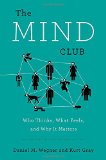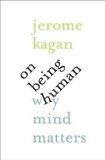March 26, 2016
(NOTE: As an Amazon Associate I earn from qualifying purchases.)
Comments (0)
- human evolution
March 22, 2016
(NOTE: As an Amazon Associate I earn from qualifying purchases.)

The Mind Club: Who Thinks, What Feels, and Why It Matters by Daniel M. Wegner and Kurt Gray (Viking, 2016)
(kindle ed.), (amazon.co.uk)
Book description from the publisher:
From dogs to gods, dive into the science of mysterious minds–including your own.
Nothing seems more real than the minds of other people. When you consider what your boss is thinking or whether your spouse is happy, you are admitting them into the “mind club.” It’s easy to assume other humans can think and feel, but what about a cow, a computer, a corporation? What kinds of mind do they have? Daniel M. Wegner and Kurt Gray are award-winning psychologists who have discovered that minds–while incredibly important–are a matter of perception. Their research opens a trove of new findings, with insights into human behavior that are fascinating, frightening and funny. The Mind Club explains why we love some animals and eat others, why people debate the existence of God so intensely, how good people can be so cruel, and why robots make such poor lovers. By investigating the mind perception of extraordinary targets–animals, machines, comatose people, god–Wegner and Gray explain what it means to have a mind, and why it matters so much. Fusing cutting-edge research and personal anecdotes, The Mind Club explores the moral dimensions of mind perception with wit and compassion, revealing the surprisingly simple basis for what compels us to love and hate, to harm and to protect.
Comments (0)
- mind,new books,psychology
March 10, 2016
(NOTE: As an Amazon Associate I earn from qualifying purchases.)

On Being Human: Why Mind Matters by Jerome Kagan (Yale University Press, 2016)
(kindle ed.), (amazon.co.uk), (UK kindle ed.)
Book description from the publisher:
In this thought-provoking book, psychologist Jerome Kagan urges readers to sally forth from their usual comfort zones. He ponders a series of important nodes of debate while challenging us to examine what we know and why we know it. Most critically he presents an elegant argument for functions of mind that cannot be replaced with sentences about brains while acknowledging that mind emerges from brain activity.
Kagan relies on the evidence to argue that thoughts and emotions are distinct from their biological and genetic bases. In separate chapters he deals with the meaning of words, kinds of knowing, the powerful influence of social class, the functions of education, emotion, morality, and other issues. And without fail he sheds light on these ideas while remaining honest to their complexity.
Thoughtful and eloquent, Kagan’s On Being Human places him firmly in the tradition of Renaissance essayist Michel de Montaigne, whose appealing blend of intellectual insight, personal storytelling, and careful judgment has attracted readers for centuries.
Google Books preview:
Comments (0)
- cognitive science,new books,psychology
March 7, 2016
(NOTE: As an Amazon Associate I earn from qualifying purchases.)
Comments (0)
- Uncategorized




